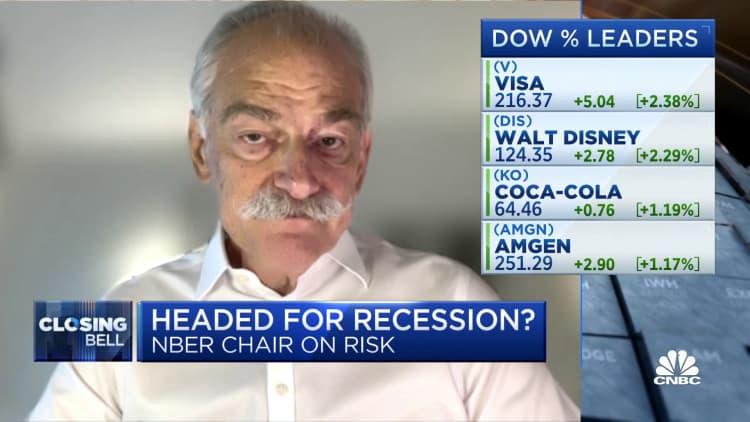BEIJING — China reported data for July that came in well below expectations as the real estate slump and Covid controls dragged down growth.
Retail sales grew by 2.7% in July from a year ago, the National Bureau of Statistics said Monday. That's well below the 5% growth forecast by a Reuters poll, and down from growth of 3.1% in June. Within retail sales, catering, furniture and construction-related categories saw declines.
Sales of autos, one of the largest categories by value, rose by 9.7%. The gold, silver and jewelry category saw sales rise the most, up by 22.1%. Online sales of physical goods rose by 10% year-on-year, faster than in June, according to CNBC calculations of official data.
Industrial production rose by 3.8%, also missing expectations for 4.6% growth and a drop from the prior month's 3.9% increase.
Fixed asset investment for the first seven months of the year rose by 5.7% from a year ago, missing expectations for 6.2% growth.

Investment into real estate fell at a faster pace in July than June, while investment into manufacturing slowed its pace of growth. Investment into infrastructure rose at a slightly faster pace in July than in June. Fixed asset investment data is only released on a year-to-date basis.
"This year, the property market overall has shown a downward trend," Fu Linghui, spokesperson of the National Bureau of Statistics, told reporters in Mandarin, according to a CNBC translation.
"Real estate investment has declined, and may have had some impact on related consumption," he said.
Young people's unemployment climbs
While the overall unemployment rate in cities ticked lower to 5.4% in July, that of young people remained persistently high.
The unemployment rate among China's youth, ages 16 to 24, was 19.9%. That's the highest on record, according to Wind data going back to 2018.
Fu attributed the high level of youth unemployment to Covid's impact on businesses' operations and their ability to hire.
In particular, he noted how the services sector, where young people typically account for a greater number of jobs, has recovered rather slowly. Fu also pointed to was young people's current preference for jobs with more stability.
Stable jobs in China typically include those at state-owned enterprises rather than positions at start-ups or smaller companies.
"The national economy maintained the momentum of recovery," the statistics bureau said in a statement. But it warned of rising "stagflation risks" globally and said "the foundation for the recovery of the domestic economy is yet to be consolidated."
Analyst forecasts for July were projected to show a pickup in economic activity from June, as China put the worst of this year's Covid-related lockdowns behind it, especially in the metropolis of Shanghai.
Exports remained robust last month, surging by 18% year-on-year in U.S. dollar terms despite growing concerns of falling global demand. Imports lagged, climbing by just 2.3% in July from a year earlier.
However, China's massive real estate sector has come under renewed pressure this summer. Many homebuyers halted their mortgage payments to protest developer delays in constructing homes, which are typically sold ahead of completion in China.
The deterioration in confidence puts developers' future sales — and an important source of cash flow — at risk.
Statistics spokesperson Fu described the construction delays as specific to some regions.
He said the real estate market is "in a stage of building a bottom" and its impact on the economy will "gradually improve."
Fu said in response to a separate question that once Covid is under control, consumers' pent up demand will be released.
The potential for a Covid outbreak has remained another drag on sentiment. A surge of infections in tourist destinations, especially the island province of Hainan, stranded tens of thousands of tourists this month.
The local situation reflects the large gap between goals set at the beginning of the year and the ensuing reality. Hainan had set a GDP target of 9%, but was only able to grow by 1.6% in the first six months.
Similarly, at a national level, China's GDP grew by just 2.5% in the first half of the year, running well below the full-year target of around 5.5% set in March.
When asked about the target Monday, Fu did not discuss it specifically. But he pointed to a host of challenges for growth at home and abroad, including growing uncertainties overseas.
Looking ahead, Fu said China's economy "still faces many risks and challenges" in sustaining its recovery and maintaining operations in a "reasonable range."
China's top leaders indicated at a meeting in late July the country might miss its GDP goal for the year. The meeting did not signal any forthcoming large-scale stimulus, while noting the importance of stabilizing prices.
The country's consumer price index hit a two-year high in July as pork prices rebounded.
Ahead of Monday morning's data release, the People's Bank of China unexpectedly cut rates on two of its lending rates — both for the first time since January, according to Citi.


